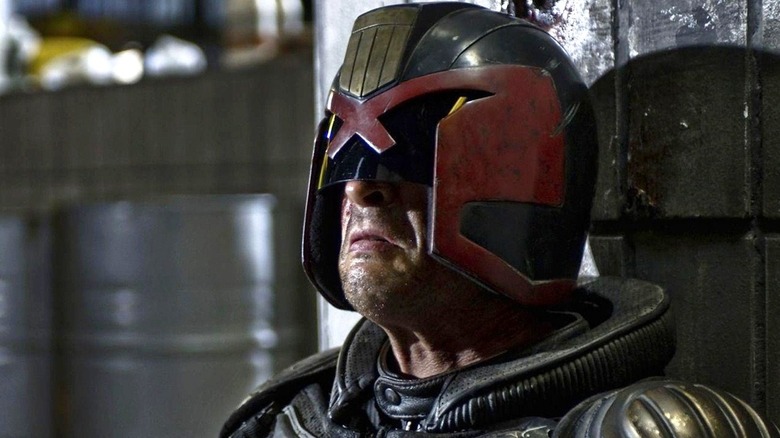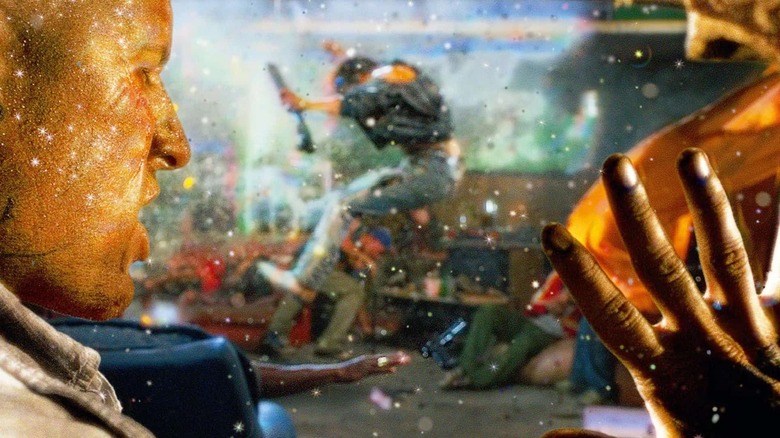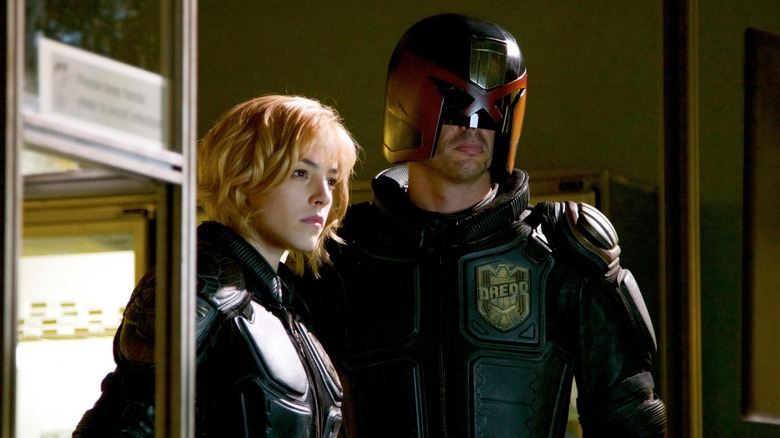Karl Urban Brings Action Worth Watching To Netflix's Top Charts With 2012's Dredd
In an ideal world, Netflix's weekly Top 10 would make it easier for films that didn't deserve to flop at the box office to connect with viewers. That's not the case, of course. Instead, the streamer's weekly list of its most-watched films (assuming they are, in fact, its most-watched films as Netflix claims they are, which is one of the major issues at the heart of the ongoing WGA and SAG-AFTRA strikes) is typically dominated by oddities or forgettable genre movies from years past. Every once in a while, however, the Netflix algorithm gets it right and either breathes fresh life into a treasured gem or, in this week's case, further affirms a film's well-earned cult status.
"Dredd," the 2012 film adaptation of 2000 AD's "Judge Dredd" comic strip, has already enjoyed a long shelf life since it misfired at the box office over a decade ago. According to the site FlixPatrol, which aggregates Netflix viewing data, "Dredd" found its way into Netflix's Top 10 in the U.S. on September 7, 2023. In a fortuitous turn of events, that means the film cracked the streamer's Top 10 exactly 11 years after its theatrical debut in the UK and just two weeks short of 11 years after its release in the States. If only one could time-travel back to that date in history, one imagines the film's cast and crew would take solace in learning we're still talking about their bleak, hard-hitting sci-fi action flick well beyond its disappointing opening day sales.
"I hope you like your films dark and gritty," I recall the film's star, Karl Urban, declaring during its premiere at San Diego Comic-Con in July 2012. He wasn't kidding around, either, as we in the audience would soon find out.
Slo-Mo and chill
Before he helmed cerebral and haunting sci-fi films like "Ex Machina" and "Annihilation," the multi-talented Alex Garland got his uncredited start as a director on "Dredd." The film takes place in 2080, a time in which most of the Earth has been ravaged by years of war, save for the dangerously overcrowded and crime-riddled metropolis Mega-City One. Tasked with maintaining some semblance of order are the Judges, a class of law enforcers who are granted the powers of judge, jury, and executioner. Among the more feared Judges is Dredd (Urban), a bloke who always keeps his face covered by his helmet, save for his mouth, which is locked into a permanent scowl. One just hopes this isn't a "Frank" type of situation and Dredd actually takes that thing off while he's showering.
"Dredd" follows its namesake as he and the newbie Judge Anderson (Olivia Thirlby) take on the sadistic drug lord Ma-Ma (Lena Headey) and her cronies by infiltrating their base of operations: a 200-story high-rise. That single-day, single-location setup lends itself to a taut, white-knuckle thrill ride as Dredd and Anderson must blast their way through the seemingly endless army of goons that populate Ma-Ma's home turf. Adding to the impact of the film's brutal action are the POV shots from characters on Slo-Mo, a futuristic drug that allows its users to perceive time at one percent of how they normally do. That means we have to watch bullets ripping through people or bodies being reduced to bloody smithereens as they fall from great heights in slow, horrifically graphic detail.
'I am the law'
Reviews were very much on the film's side, so why did "Dredd" flop? It probably didn't help that the original "Judge Dredd" comics are relatively niche, which meant audiences were mostly only familiar with the property thanks to the 1995 Sylvester Stallone box office bomb "Judge Dredd" (a film that, ridiculous as it may be, is not without its redeeming qualities). That and "Dredd" had the bad luck of arriving shortly after Gareth Evans' instant classic "The Raid: Redemption," an action film with a noticeably similar premise — even though the two films have little in common beyond that (not to mention, "Dredd" was in the works long before "The Raid" set a new bar for vicious brawls in tight-knit spaces).
The other factor might've been that "Dredd" is actually pretty faithful to its source material's satirical spirit. The "Judge Dredd" universe was never depicted as a future worth aspiring to in the earliest comics, nor is that the case in Garland's film. Dredd himself is similarly a vacuum of charisma; even when he delivers his famous catchphrase ("I am the law"), it comes across as a legitimate threat, not the sort of winking one-liner Arnold Schwarzenegger would drop while taking out bad guys. By the end of the film, you don't get a sense that things will ever improve in Mega-City One, either. The senseless cycle of violence will continue as Judges like Dredd only rack up a larger and larger body count until being killed themselves.
Back in 2012, audiences weren't necessarily ready for an action film that suggested doubling down on law enforcement rather than investing in other areas of society would only make the world a worse place to live in. But in 2023? "Dredd" feels uncomfortably prescient.


